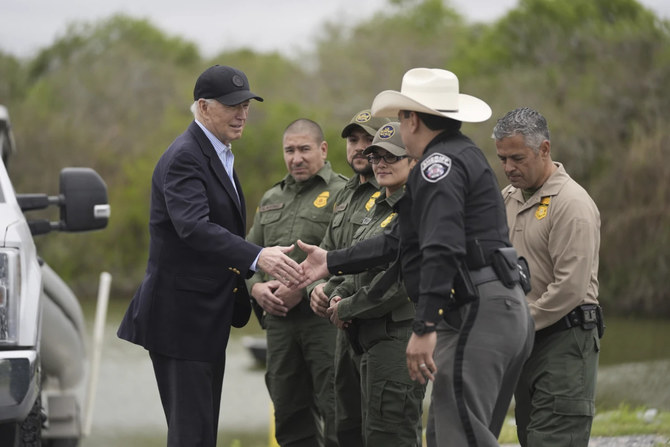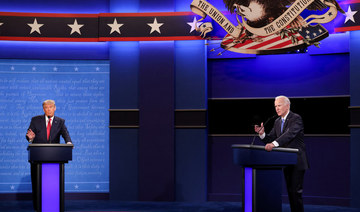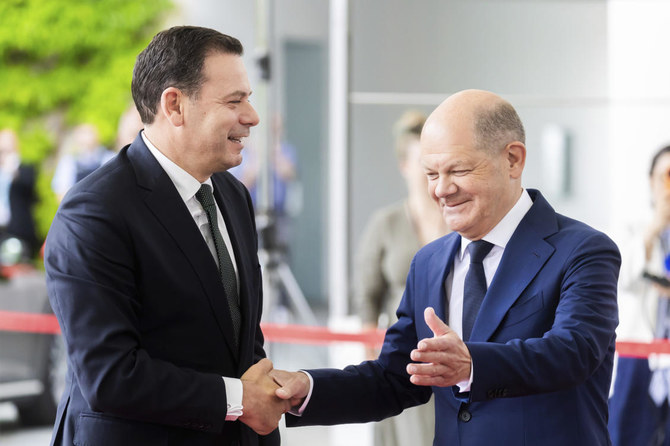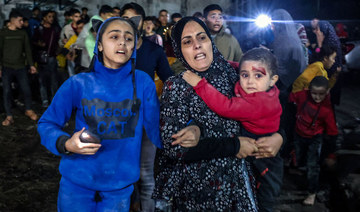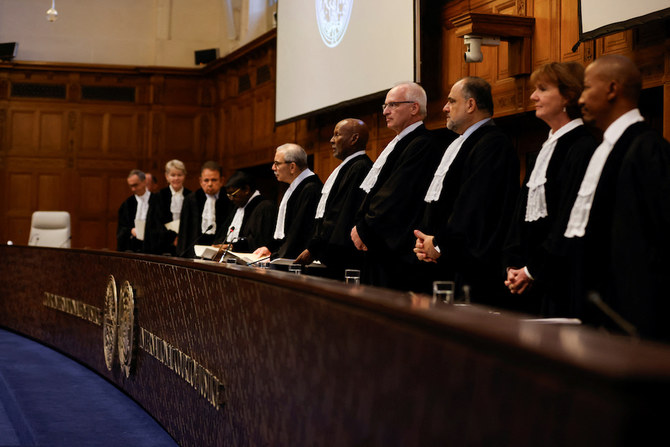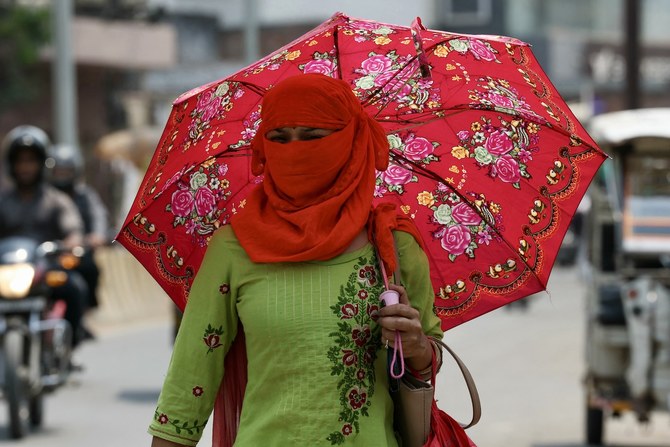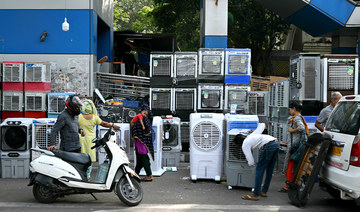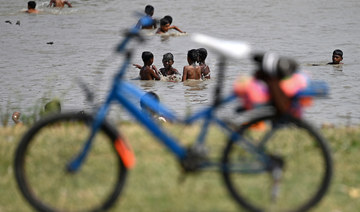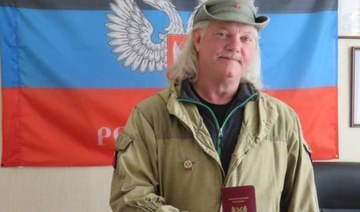WASHINGTON: Joe Biden and Donald Trump are two presidents with unfinished business and an itch to get it done.
Their track records and plans on abortion, immigration, taxes, wars abroad — you name it — leave no doubt that the man voters choose in November will seek to shape the landscape of American life in ways wholly distinct from the other.
The choices, if the winner gets his way, are sharply defined. The onward march of regulation and incentives to restrain climate change, or a slow walk if not an about-face. Higher taxes on the super rich, or not. Abortion rights reaffirmed, or left to states to restrict or allow as each decides. Another attempt to legislate border security and orderly entry into the country, or massive deportations. A commitment to stand with Ukraine or let go.
At no time in living memory have two presidents, current and former, competed for the office. Not since Presidents Teddy Roosevelt and William Howard Taft, both Republicans, in 1912, and that didn’t work out for either of them — Democrat Woodrow Wilson won that three-way race.
More than a century later, voters again get to judge two presidents on their records alongside their promises for the next four years. Here’s where they stand on 10 of the top issues:
Abortion
BIDEN: The president has called for Congress to send him legislation that would codify in federal law the right to an abortion, which stood for nearly 50 years before being overturned by the Supreme Court. He has also criticized statewide bans on abortion in Republican states and says he will veto any potential nationwide ban should one come to his desk. In the absence of legislation, his administration has taken narrower actions, such as proposals that would protect women who travel to obtain abortions and limit how law enforcement collects medical records.
TRUMP: The former president often brags about appointing the Supreme Court justices who overturned Roe v. Wade, ending the constitutional right to an abortion. After dodging questions about when in pregnancy he believes the procedure should be restricted, Trump announced in April that decisions on access and cutoffs should be left to the states. He said he would not sign a national abortion ban into law. But he’s declined to say whether he would try to limit access to the abortion pill mifepristone. He told Time magazine in recent interviews that it should also be left up to states to determine whether to prosecute women for abortions or to monitor their pregnancies.
Climate/Energy
BIDEN: In a second term, Biden could be expected to continue his focus on implementing the climate provisions of his Inflation Reduction Act, which provided nearly $375 billion for things like financial incentives for electric cars and clean energy projects. Biden is also enlisting more than 20,000 young people in a national “Climate Corps,” a Peace Corps-like program to promote conservation through tasks such as weatherizing homes and repairing wetlands. Biden wants to triple the group’s size this decade. Despite all this, it’s unlikely that the US will be on track to meet Biden’s goal of reducing greenhouse gas emissions by half by 2030.
TRUMP: His mantra for one of his top priorities: “DRILL, BABY, DRILL.” Trump, who in the past cast climate change as a “hoax” and harbors a particular disdain for wind power, says it’s his goal for the US to have the cheapest energy and electricity in the world. He’d increase oil drilling on public lands, offer tax breaks to oil, gas and coal producers, speed the approval of natural gas pipelines and roll back the Biden administration’s aggressive efforts to get people to switch to electric cars, which he argues have a place but shouldn’t be forced on consumers. He has also pledged to re-exit the Paris Climate Accords, end wind subsidies and eliminate regulations imposed and proposed by the Biden administration targeting energy-inefficient kinds of lightbulbs, stoves, dishwashers and shower heads.
Democracy/Rule of law
BIDEN: Protecting democracy has been the raison d’etre behind Biden’s decision to run for reelection. In a symbolic nod to the Revolutionary War, Biden delivered his first campaign speech of 2024 near Valley Forge, Pennsylvania, where he spoke of George Washington’s decision to step down as the leader of the Continental Army after American independence was won. During the Jan. 5 speech, Biden said this year’s presidential contest is “all about” whether US democracy will survive and he regularly condemns Trump’s denial that he lost the 2020 general election. Biden has called the Jan. 6, 2021, assault on the Capitol a “day that we nearly lost America — lost it all.”
TRUMP: The former president, who famously refused to accept his loss to Biden in 2020, has not committed to accepting the results this time. “If everything’s honest, I’ll gladly accept the results,” Trump recently told the Milwaukee Journal Sentinel. “If it’s not, you have to fight for the right of the country.” He has said he will pardon the Jan. 6 defendants jailed for assaulting police officers and other crimes during the attack on the Capitol. He vows to overhaul the Justice Department and FBI “from the ground up,” aggrieved by the criminal charges the department has brought against him. He also promises to deploy the National Guard to cities such as Chicago that are struggling with violent crime, and in response to protests, and has also vowed to appoint a special prosecutor to go after Biden.
Federal government
BIDEN: The Biden administration is already taking steps to make it harder for any mass firings of civil servants to occur. In April, the Office of Personnel Management issued a new rule that would ban federal workers from being reclassified as political appointees or other at-will employees, which makes them easier to dismiss. That was in response to Schedule F, a 2020 executive order from Trump that reclassified tens of thousands of federal workers so they could be fired more easily.
TRUMP: The former president vows an overhaul of the federal bureaucracy, which he has long blamed for stymying his first term agenda: “I will totally obliterate the deep state.” He plans to reissue the Schedule F order stripping civil service protections. He’d then move to fire “rogue bureaucrats,” including those who ”weaponized our justice system,” and the “warmongers and America-Last globalists in the Deep State, the Pentagon, the State Department, and the national security industrial complex.” He’s pledged to terminate the Education Department and wants to curtail the independence of regulatory agencies like the Federal Communications Commission.
Immigration
BIDEN: The president continues to advocate for the comprehensive immigration bill he introduced on his first day in office, which would grant an eight-year pathway to citizenship for immigrants in the US without legal status, with a faster track for young immigrants living in the country illegally who were brought here as children. That legislation went nowhere in Congress. This year, the president backed a Senate compromise that included tougher asylum standards and billions more in federal dollars to hire more border agents, immigration judges and asylum officers. That deal collapsed on Capitol Hill due to Trump’s opposition. Biden is currently considering executive action on the border, particularly if the number of illegal crossings increases later this year.
TRUMP: The former president promises to mount the largest domestic deportation in US history — an operation that could include detention camps and the National Guard. He’d bring back policies he put in place during his first term, like the Remain in Mexico program and Title 42, which placed curbs on migrants on public health grounds. And he’d revive and expand the travel ban that originally targeted citizens from seven Muslim-majority countries. After the Oct. 7 Hamas attack on Israel, he pledged new “ideological screening” for immigrants to bar “dangerous lunatics, haters, bigots, and maniacs.” He’d also try to deport people who are in the US legally but harbor “jihadist sympathies.” He’d seek to end birthright citizenship for people born in the US whose parents are both in the country illegally.
Israel/Gaza
BIDEN: The war in Gaza, far more so than other national security considerations, has defined Biden’s foreign policy this year, with significant political implications. He has offered full-throated support for Israel since Hamas militants launched a surprise deadly assault on Oct. 7. But as the death toll in Gaza continues to climb, Biden has faced massive backlash at home. His administration is working to broker a temporary ceasefire that would release some hostages held by Hamas, which would also allow for more humanitarian aid to enter the war-torn region. Biden also calls for a two-state solution, which would have Israel existing alongside an independent Palestinian state.
TRUMP: The former president has expressed support for Israel’s efforts to “destroy” Hamas but he’s also been critical of some of Israel’s tactics. He says the country must finish the job quickly and get back to peace. He has called for more aggressive responses to pro-Palestinian protests at college campuses and applauded police efforts to clear encampments. Trump also proposes to revoke the student visas of those who espouse antisemitic or anti-American views.
LGBTQ Issues
BIDEN: The president and White House officials regularly denounce discrimination and attacks against the LGBTQ community. Shortly after he took office, Biden reversed an executive order from Trump that had largely banned transgender people from military service, and his Education Department completed a rule in April that says Title IX, the 1972 law that was passed to protect women’s rights, also bars discrimination based on sexual orientation or gender identity. The new rule was silent on the issue of transgender athletes.
TRUMP: The former president has pledged to keep transgender women out of women’s sports and says he will ask Congress to pass a bill establishing that “only two genders,” as determined at birth, are recognized by the United States. He promises to “defeat the toxic poison of gender ideology.” As part of his crackdown on gender-affirming care, he would declare that any health care provider that participates in the “chemical or physical mutilation of minor youth” no longer meets federal health and safety standards and won’t get federal money. He’d take similarly punitive steps in schools against any teacher or school official who “suggests to a child that they could be trapped in the wrong body.” Trump would support a national prohibition of hormonal or surgical intervention for transgender minors and bar transgender people from military service.
NATO/Ukraine
BIDEN: The president has spent much of his time rebuilding alliances unraveled by Trump, particularly NATO, a critical bulwark against Russian aggression. Since the onset of Russia’s invasion of Ukraine, Biden has pledged unceasing support to Kyiv and he made an unannounced visit there in February 2023 in a show of solidarity. His administration and Congress have sent tens of billions of dollars in military and other aid to Ukraine. The latest tranche of aid totaled $61 billion in weapons, ammunition and other assistance and is expected to last through this year. Continued US assistance is critical, Biden says, because he argues that Russian leader Vladimir Putin will not stop at invading Ukraine.
TRUMP: The former president has repeatedly taken issue with US aid to Ukraine and says he will continue to “fundamentally reevaluate” the mission and purpose of the NATO alliance if he returns to office. He has claimed, without explanation, that he will be able to end the war before his inauguration by bringing both sides to the negotiating table. (His approach seems to hinge on Ukraine giving up at least some of its Russian-occupied territory in exchange for a ceasefire.) On NATO, he has assailed member nations for years for failing to hit agreed-upon military spending targets. Trump drew alarms this year when he said that, as president, he had warned leaders that he would not only refuse to defend nations that don’t hit those targets, but “would encourage” Russia “to do whatever the hell they want” to countries that are “delinquent.”
Tariffs/trade
BIDEN: This is where Biden and his protectionist tendencies — in a continued appeal to working-class voters — have some similarities with Trump. Biden is calling for a tripling of tariffs on Chinese steel, a move that would shield US producers from cheaper imports. The current tariff rate is 7.5 percent for both steel and aluminum but Biden wants that to go to 25 percent. Biden has also said he opposes the proposed acquisition of US Steel by Japan’s Nippon Steel, because it is “vital for it to remain an American steel company that is domestically owned and operated.”
TRUMP: The former president wants a dramatic expansion of tariffs, proposing a levy of perhaps 10 percent on nearly all imported foreign goods. Penalties would increase if trade partners manipulate their currencies or engage in other unfair trading practices. He would also urge Congress to pass legislation giving the president authority to impose a reciprocal tariff on any country that imposes one on the US Much of his trade agenda has focused on China. Trump has proposed phasing out Chinese imports of essential goods including electronics, steel and pharmaceuticals and wants to ban Chinese companies from owning US infrastructure in sectors such as energy, technology and farmland. Whether higher tariffs come from a Biden administration or a Trump one, they are likely to raise prices for consumers who have already faced higher costs from inflation.
Taxes
BIDEN: In his State of the Union address, Biden proposed raising the corporate tax rate to 28 percent and the corporate minimum tax to 21 percent as a matter of “fundamental fairness” that will bring in more money to invest in Americans. The current corporate rate is 21 percent and the corporate minimum, raised under the Inflation Reduction Act, is at 15 percent for companies making more than $1 billion a year. Biden also wants to require billionaires to pay at least 25 percent of their income in taxes and to restore the child tax credit that was enacted under his 2021 COVID-19 relief package, but has since expired.
TRUMP: The former president has promised to extend the tax cuts he signed into law in 2017 and that are due to sunset at the end of 2025. That package cut the corporate tax rate from 35 percent to 21 percent and roughly doubled the standard deduction and child tax credit.




